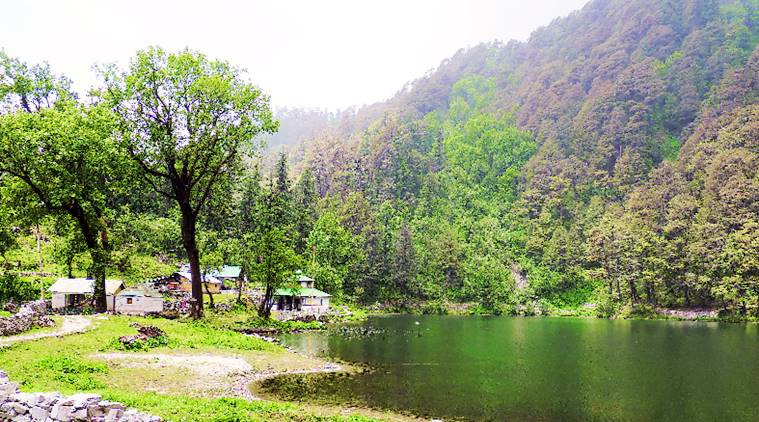- India
- International
Save Me a Lake
Officials and communities must come together to save Dodital in Uttarakhand from the clutches of unregulated tourism.
 One of Uttarakhand’s most precious natural sites, Dodital lake urgently needs to be protected against the usual suspect: reckless tourism. (Source: Stephen Alter)
One of Uttarakhand’s most precious natural sites, Dodital lake urgently needs to be protected against the usual suspect: reckless tourism. (Source: Stephen Alter)
During a recent trek in Garhwal, I was reminded, once again, of nature’s tremendous wealth and the careless ways in which we squander it. If money grew as leaves on trees, we wouldn’t cut them down and forests would be protected. Roadside signs remind us: “Trees are nature’s green gold.” But beyond the empty platitudes and hollow slogans of “eco-development”, we must make a fundamental choice if we are to invest in a future that is genuinely “green and clean.”
One of the halts on our trek was Dodital, a small lake 3,000 meters above sea level. It is one of Uttarakhand’s most beautiful and precious natural treasures. Over the years, I have trekked to Dodital on a number of occasions and the stillness of its waters and the dense forests that surround it evoke a sense of primal sanctity. The Uttarakhand Forest Department must be congratulated for having preserved this lake as well as it has, for there is no litter along its shores and the brown trout in its depths are plentiful and protected. The forests of fir and oak are largely untouched by human encroachment and monal pheasant crow loudly at dawn.
But in the name of “eco-tourism,” Dodital, and other places like it, are being threatened. A number of structures have been erected along the shoreline — unsightly, poorly designed rest houses and tin-roofed pavilions, already in disrepair. Signs advertise flush toilets but these aren’t functional. While we were camped on the grounds of the rest house, a group of 60 students arrived on a school trip. They were shouting and throwing stones in the water, while their tour organisers set up 30 tents nearby, as well as a full kitchen that turned out a mountain of bread pakoras for tea. A few of the students wandered around the footpath that circles Dodital, but most of them quickly set up a cricket match on the lakeshore.
Outdoor education is essential for young people to be given exposure to places like Dodital, to inspire them and ingrain in them the values of conservation. But to bring a regiment of 60 boys defeats the purpose, particularly if there is no guidance or activities that celebrate nature. Their chaperones controlled them by blowing shrill whistles and threatening: “If you get sick, we’ll leave you behind!”
When we inquired about their toilet facilities, the tour operator gestured vaguely towards the jungle. Doing excremental math is an alarming exercise. Allowing for a certain amount of constipation, let’s assume that 50 of the boys relieved themselves in the woods. At a modest 250 gm each that means at least 12 kg of human ordure was deposited around the lake, much of it along the streams that drain into Dodital. If we extrapolate from this and assume that the trekking season extends for six months and the average number of human beings, including tourists, forest guards, temple priests and tea shop owners adds up to a conservative 25 people a day, then the annual accumulation of fecal matter will be more than a ton — so, what’s the solution?
An excellent model already exists in Uttarakhand, which is the famous Bhyunder Valley, also known as the Valley of Flowers. Recognising the unique and fragile ecology of this place, the forest department only allows visitors during daylight hours. No camping is permitted and whatever buildings were once there have been demolished. Those who wish to visit are welcome to stay in one of the guest houses, dharamshalas, or the forest rest house at Gangaria, outside the park entrance. The same should be done at Dodital and other such places.

Several locations along the approach to Dodital are well suited to camping, such as Manjhi, five km short of the lake. A campsite already exists and could easily be developed by the forest department. The tea shops at Dodital can be relocated to Manjhi without any loss of income and all of the superfluous structures surrounding the lake removed. Quarters for the forest guards and the small temple can remain. However, the forest department must ensure that this religious site is not enhanced or expanded.
In this way, one can make day visits to Dodital to enjoy the beauty of the place, without polluting or destroying the environment. Those trekkers who wish to continue above Dodital to the Darwa Pass and beyond, can easily carry on without stopping overnight in Dodital. The villagers of Agora and other nearby settlements can continue to benefit from trekkers and other visitors, with the assurance that the lake itself will be preserved rather than being overrun with the kind of ill-planned clutter that ruins so many tourist destinations in the hills.
The beauty of a solution like this is that it doesn’t cost anything aside from minor expenses of demolition and the relocation of a campsite, where simple but adequate facilities, including toilets can be built. What we gain is the preservation of a priceless natural treasure that will be appreciated for years to come.
Stephen Alter lives and writes in Mussoorie.
Must Read
Buzzing Now
Apr 20: Latest News
- 01
- 02
- 03
- 04
- 05







































